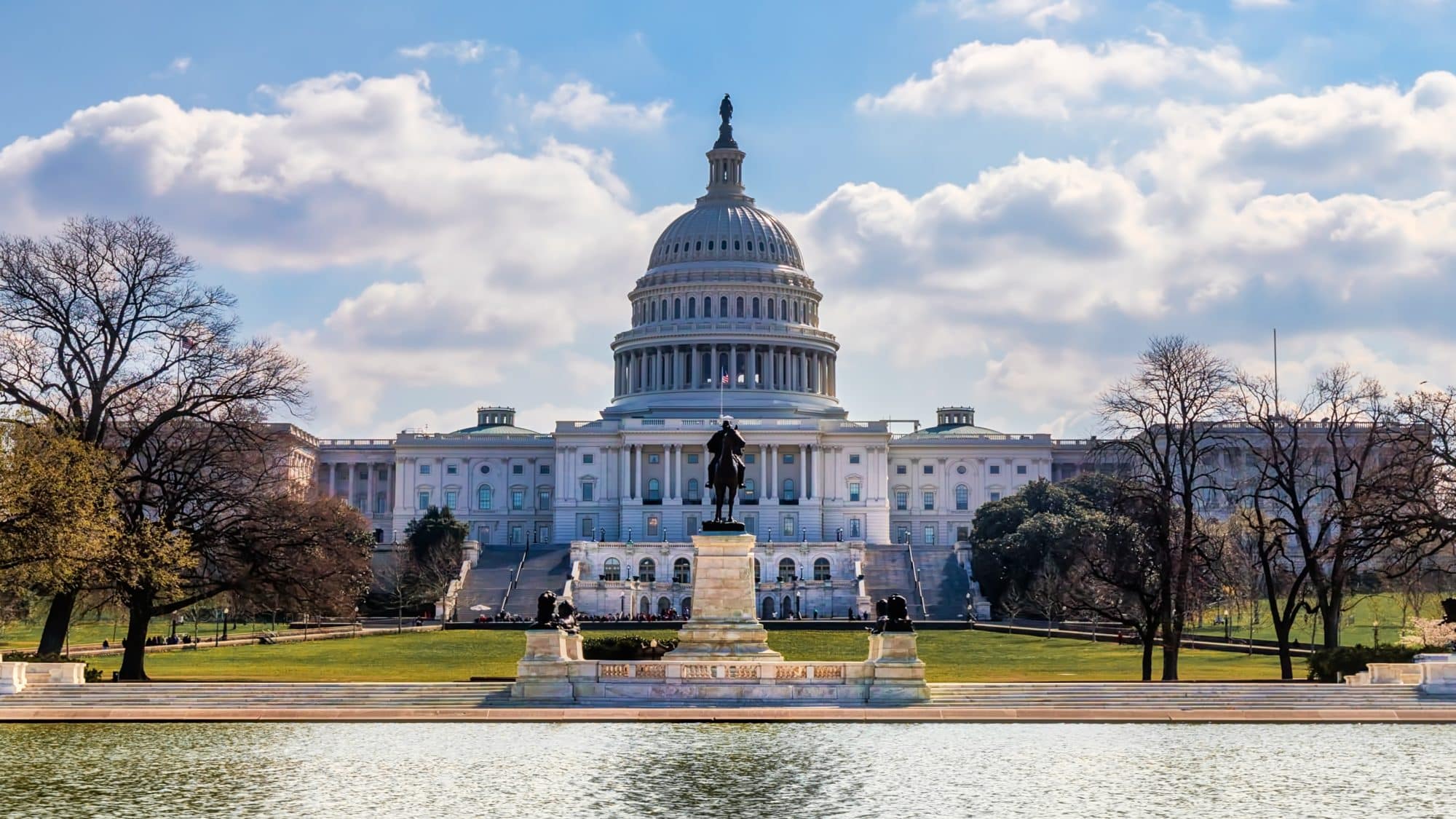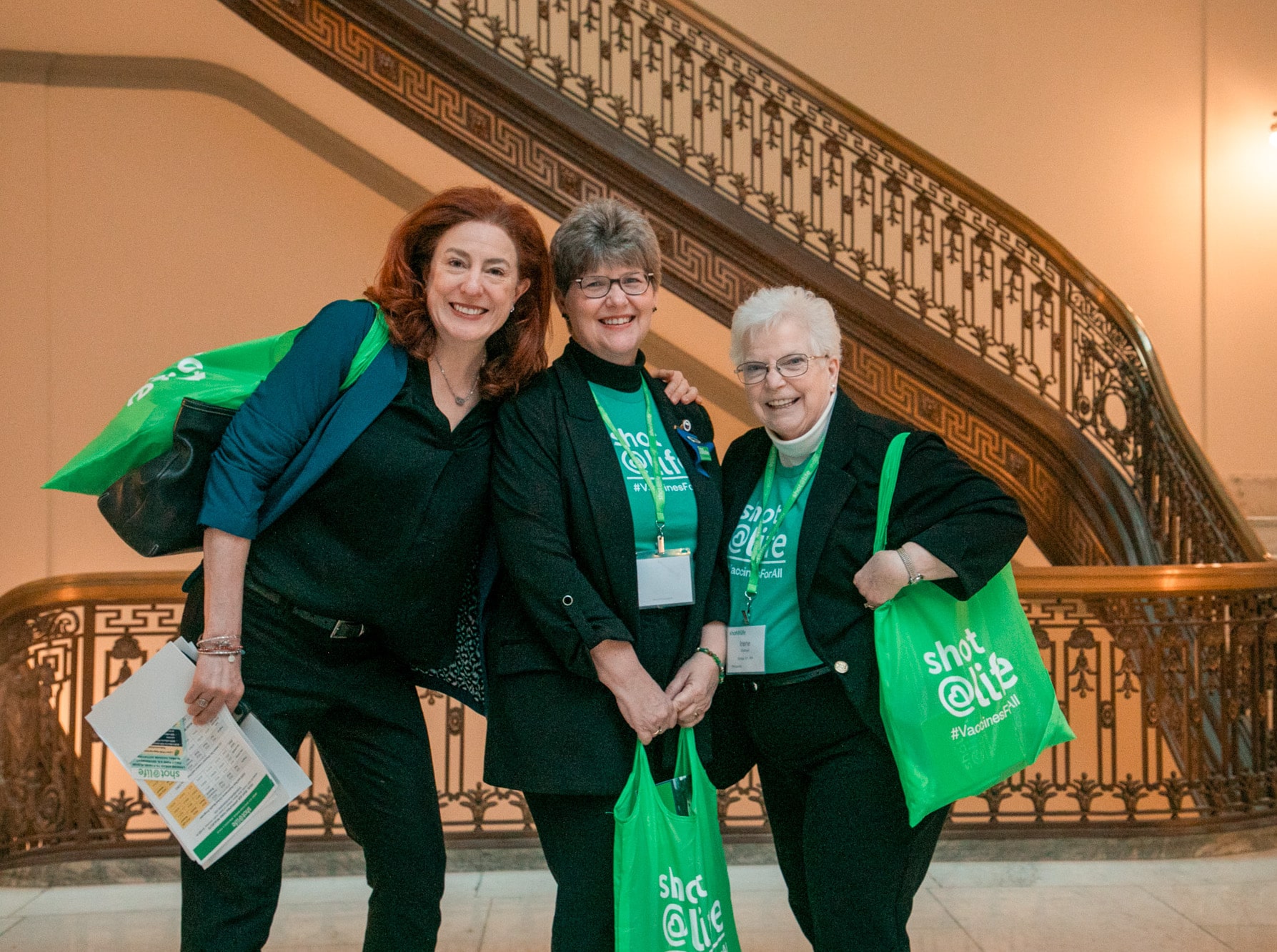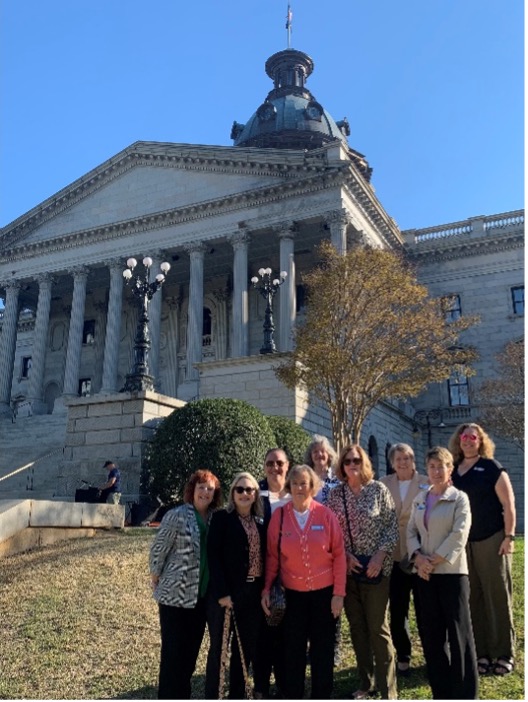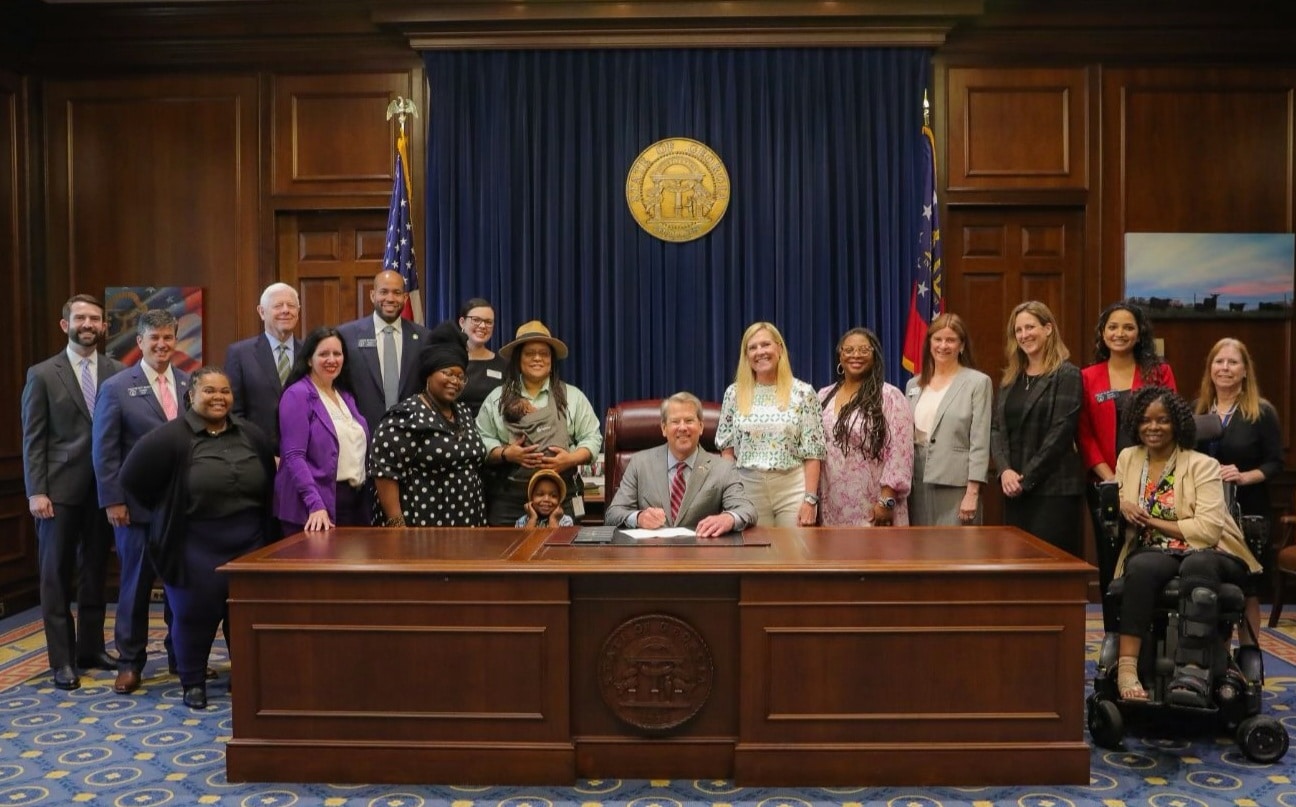Since its inception in 1890, the General Federation of Women’s Clubs (GFWC) has been a beacon of community-driven activism, uniting its members to address national and global concerns. Over the decades, dedicated groups of GFWC members, acting as grassroots activists, have left an indelible mark on society.
Central to our organization’s history is the process of introducing and supporting legislation through resolutions. Through this method, GFWC has effectively championed various causes, shaping legislative agendas and impacting policy decisions.
In our illustrious history, GFWC’s legislative strategy and our clubwomen’s advocacy have yielded significant accomplishments:
- We have tirelessly campaigned for ordinances prohibiting the sale of objectionable literature, including materials promoting crime, sex, and horror, especially those accessible to children.
- We have been vocal advocates for equitable access to vaccinations on a global scale.
- We have worked diligently to raise awareness and resources for the preservation of our national parks and the conservation of natural resources.
- We have staunchly advocated for clean water and air in all communities.
As GFWC continues its successful trajectory of grassroots advocacy, we proudly highlight legislative actions aimed at prompting Congress to address crucial issues such as domestic violence, women’s suffrage, veterans’ rights, and vaccination initiatives, among others.
Legislative Efforts During
the 118th Congress
Rape Kit Backlog
The Debbie Smith Act reauthorizes funding to law enforcement to analyze untested rape kits. DNA analysis is one of the most important methods to investigate crimes and improve the capacity of state and local prosecutors to bring these cases to court.
Status: Congress enacted H.R. 1105, Public Law 118-72.
Online Child Safety
Congress enacted the REPORT Act reauthorizing funding and services for the National Center for Missing and Exploited Children and the Project Safe Childhood Act requiring federal prosecutors and the Department of Justice to coordinate with state and local law enforcement and experts to develop training materials and strategies to identify and rescue child victims while quickly arresting offenders.
Status: Congress enacted S. 474, Public Law 118-59.
Focus Areas
VAWA Appropriations:
The Violence Against Women Act (VAWA) was reauthorized in March 2022, and the FY 2023 Omnibus Appropriations bill provided historically high funding levels for programs to serve survivors and strengthen prevention programs. GFWC urged Congress to provide increased federal funding for FY 2024 and FY 2025. Status: Congress increased FY 2024 funding for a few of the VAWA programs and has approved a FY 2025 Continuing Resolution (CR) until March 14, 2025, which provides level funding for all programs and services.
Victims of Crime Act: GFWC advocated for changes in the funding formula for the Crime Victims Fund authorized by the Victims of Crime Act (VOCA). The VOCA Fund is financed by fines and penalties from convictions in federal cases, not from tax dollars. There is a significant shortfall, so legislation was proposed to expand the formula. Status: An effort to include the VOCA formula legislation in the FY 2025 Continuing Resolution failed.
Anti-trafficking: GFWC urged Congress to pass anti-trafficking and anti-exploitation bills reauthorizing essential programs to support survivors and combat human trafficking in all forms, both domestically and internationally. Status: The FY 2025 National Defense Authorization Act included the State Department’s authorization bill which expands investigative authority for transnational human trafficking violations. GFWC cosigned a letter supporting the Trafficking Victims Protection Act which passed the House of Representatives and urged the Senate to combine it with the International Trafficking Victims Protection Act which passed the Senate. The Supporting Victims of Human Trafficking Act, S. 4640, passed the Senate and was pending approval in the House on the consent calendar when negotiations broke down on the appropriations package. Congress adjourned before taking final action on these three measures.
Strengthening Protections for Domestic Violence and Stalking Survivors Act: GFWC urged Congress to pass legislation to fully close the “dating loophole” in federal firearms law which allows dating partners subject to final protective orders to legally possess firearms, and the “stalking loophole” which allows people convicted of misdemeanor stalking to legally possess firearms. Legislation (H.R. 905, S. 321) was in response to a February 2023 ruling by the U.S. Court of Appeals for the 5th Circuit in United States v. Rahimi which struck down 30 years of federal law prohibiting those under a protective order for domestic violence from possessing firearms.
Status: In late June 2024, the U.S. Supreme Court ruled 8-1 in the case of US v. Rahimi affirming that individuals subject to a domestic violence restraining order are restricted from legally possessing a firearm. Civil protection orders are a critical piece of safety for many domestic violence survivors around the country and this is a huge victory. Ruth Glenn, then President of Public Affairs for the National Coalition Against Domestic Violence and the National Domestic Violence Hotline, spoke to the GFWC Board of Directors in September 2023 about her life as a survivor of gun violence by her husband and her advocacy work to impact public policy.
Family Violence Prevention and Services Act Reauthorization (FVPSA): GFWC supports increased funding for domestic violence shelters and services for survivors; increased access to programs and services for tribes, communities of color, and underserved communities; investment in 24-hour hotlines; prevention programs for local communities; and enhanced victim services through training and technical assistance. Status: Advocates strategically decided to focus on FY 2024 and FY 2025 appropriations. A FY 2025 Continuing Resolution is in place until March 14, 2025.
GFWC Supports National Task Force to End Sexual and Domestic Violence’s VAWA Appropriation Requests.
VAWA Appropriations FY 2022, FY 2023, FY 2024, and FY 2025
GFWC supported efforts to prevent online sexual exploitation of children. The STOP CSAM Act expands civil remedies for victims of online sexual exploitation and requires the removal of related exploitive visual depictions. The Eliminating Abusive and Rampant Neglect of Interactive Technologies Act (EARN IT Act) removes the technology industry’s liability protection shield for third-party content which would then allow state and federal lawsuits. The Kids Online Safety Act (KOSA) sets out requirements for covered platforms to protect minors from online abuse. The Project Safe Childhood Act modernizes the Department of Justice’s Project Safe Childhood Program to enhance law enforcement’s response to online child sexual exploitation. The REPORT Act ensures tech companies are held accountable to report and remove child sex abuse material and strengthen protections for kids online. The TAKE IT DOWN Act would criminalize the publication on nonconsensual intimate imagery, including AI-generated images and require social media and other websites to remove such images within 48 hours of receiving notice from the victim. The DEFIANCE Act would allow civil action against individuals who knowingly produce, distribute, or receive nonconsensual sexually explicit digital forgeries.
Status: Congress enacted the REPORT Act reauthorizing funding and services for the National Center for Missing and Exploited Children and the Project Safe Childhood Act requiring federal prosecutors and the Department of Justice to coordinate with state and local law enforcement and experts to develop training materials and strategies to identify and rescue child victims while quickly arresting offenders. The Senate passed the SHIELD Act, the Kids Online Safety Act, the DEFIANCE Act, and the TAKE IT DOWN Act.
Congress enacted the Jenna Quinn Law authorizing the Department of Health and Human Services to make grants for evidence-informed child sexual abuse awareness and prevention programs. Funds can be used to support training and education for teachers and other school employees, students, and the community about how to prevent, recognize, and report child abuse, S. 1147, P.L. 118-193.
Wage discrimination based on sex must be prohibited. During the 118th Congress, legislation was introduced to prohibit employers from relying on the wage history of prospective employees when considering them for employment or determining their wages.
In April 2024, the Federal Trade Commission issued a final rule to promote competition by banning noncompete agreements nationwide, protecting the freedom of workers to change jobs. In 2009, President Obama signed the Lilly Ledbetter Fair Pay Act making it easier for working Americans to effectively challenge illegal unequal pay.
Ms. Ledbetter, a GFWC clubwoman and past speaker at GFWC, passed away in October 2024. The gender pay gap still exists and Congress has not yet passed the Paycheck Fairness Act that would strengthen the Fair Pay Act by closing loopholes in the defenses for equal pay violations, providing stronger remedies, and expanding protection against discrimination against employees who share or inquire about their compensation at work.
Congress passed a FY 2025 Continuing Resolution through March 14, 2025, providing level funding for the education and library programs.
In November 2021, President Biden signed the Infrastructure and Jobs Act which provided $65 billion for broadband infrastructure. During FY 2024 and FY 2025, federal agencies have implemented at least three funding rounds for significant broadband investment nationwide.
GFWC urges Congress to fully fund global childhood immunizations. GFWC supports funding the CDC’s polio eradication and measles elimination programs through the Health and Human Services appropriations bill, and funding for the US Agency for International Development (USAID), UNICEF, the World Health Organization, and the Global Alliance for Vaccines and Immunization (Gavi, the Vaccine Alliance) programs through the State Department/Foreign Operations appropriations bill. These efforts improve global disease detection systems that enable other nations to effectively detect and efficiently respond to a range of other diseases. Preventing diseases at their source is the most cost-effective approach, saves the most lives, and makes the world more resilient to new viruses that could cause the next pandemic.
Status: Congress approved a FY 2025 Continuing Resolution until March 14, 2025 which provides level funding.
Paid Family & Medical Leave:
GFWC supports policies that support families and reduce health disparities in the workplace such as parental leave, paid family and medical leave, and pregnancy accommodations. Status: Congresswoman Lauren Underwood (D-IL) spoke at the 2024 convention in Chicago and highlighted efforts to secure paid family and medical leave, expanded Child Care tax credits, yearling postpartum Medicaid and Children’s Health Insurance Program (CHIP) coverage, and lower costs for prescriptions.
Status: With strong White House engagement, there was bipartisan success for some public health initiatives. Bold overdose prevention efforts contributed to a 14.5 percent decrease in overdose deaths, the first time since 2018 that the US has seen a decline. Naloxone, an opioid overdose antidote, is available over the counter. Access to treatment options improved such as telehealth provisions becoming permanent. More illicit fentanyl was seized at U.S. ports in two years than in the previous five years combined. The Inflation Reduction Act contained numerous provisions to make it easier for older adults to afford medications. In 2025, for those enrolled in Medicare Part D, there is a $2,000 cap on out-of-pocket costs for prescription drugs. Medicare is now able to negotiate the prices of drugs with manufacturers: the first 10 drugs produced significant savings. In January 2025, the Center for Medicare and Medicaid Services (CMS) added 15 more drugs to negotiation. Efforts to restrict the influence of pharmacy benefit managers were deleted from the final FY 2025 Continuing Resolution passed by Congress.
The bipartisan National Alzheimer’s Project Act (NAPA) reauthorization bill (H.R. 619, S. 133) builds upon efforts originally approved in 2011 and extends the work of the National Plan to Address Alzheimer’s Disease, emphasizes the importance of healthy aging and risk reduction, and addresses health disparities among underrepresented populations. The Alzheimer’s Accountability and Investment Act (H.R. 620, S. 134) would continue to prioritize Alzheimer’s and dementia research funding at the National Institutes of Health. With robust and steady investment, scientists will be able to work faster to advance basic disease knowledge, explore ways to reduce risk, uncover new biomarkers for early diagnosis and drug targeting, and develop potential treatments.The third bill, the BOLD Infrastructure for Alzheimer’s Reauthorization Act, provides state, local, and tribal public health officials with essential funding and resources to advance brain health education, enhance early detection and diagnosis, and support caregivers.
Status: All three bills were enacted by Congress.
Food Insecurity
In coordination with the GFWC National Day of Service on Saturday, September 28, 2024, GFWC members utilized the Legislative Action Center to urge Congress to enact full funding for nutrition programs, including the Special Supplemental Nutrition Program for Women, Infants, and Children (WIC), the Supplemental Nutrition Assistance Program (SNAP), and the Child Nutrition Program which includes the school lunch program, school breakfast program, and the Summer EBT program to ensure schools can continue to serve healthy meals to all eligible children.

OUR IMPACT
GFWC members vary in age, talents, location, background, and profession, but are united in their dedication to actively improve the lives of others.
60,000+
members in affiliated clubs in every state
2,300
existing volunteer clubs across the globe
100+
founded in 1890, GFWC has over a century of history



